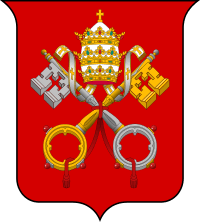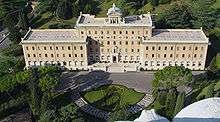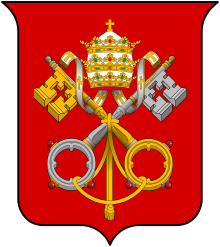Pontifical Commission for Vatican City State
The Pontifical Commission for the State of Vatican City (Italian: Pontificia Commissione per lo Stato della Città del Vaticano, Latin: Pontificia Commissio pro Civitate Vaticana) is the legislative body of Vatican City.[1] It consists of the President of the Pontifical Commission, who is also the President of the Governorate of Vatican City State, and six other cardinals appointed by the pope for five-year terms.[1]
Pontifical Commission for the State of Vatican City | |
|---|---|
 | |
| Type | |
| Type | |
| Leadership | |
President | |
| Seats | 7 |
| Elections | |
| Appointment by the Pope | |
Last election | 11 July 2018 |
| Meeting place | |
 | |
| Palace of the Governorate | |
| Website | |
| http://www.vaticanstate.va/ | |
The Pontifical Commission was created in 1939 by Pius XII. Laws and regulations proposed by the Commission must be submitted to the pope through the Secretariat of State prior to being made public and taking effect.[1] Laws, regulations, and instructions enacted by the Commission are published in the Acta Apostolicae Sedis.[2]
Current members
Current
Since 2018, the president and the members are:
| Position | Cardinal[3] | Country | Other positions |
|---|---|---|---|
| President | Cardinal Giuseppe Bertello | President of the Governorate of Vatican City State | |
| Members | Cardinal Kevin J. Farrell | Camerlengo of the Holy Roman Church Prefect of the Dicastery for Laity, Family and Life | |
| Cardinal Giuseppe Petrocchi | |||
| Cardinal Stanisław Ryłko | |||
| Cardinal Leonardo Sandri | Prefect of the Congregation for the Oriental Churches | ||
| Cardinal Domenico Calcagno | |||
| Cardinal Beniamino Stella | Prefect of the Congregation for the Clergy |
President
In addition to his legislative role, the President of the Governatorate of Vatican City State, who since 1 October 2011 has been Cardinal Giuseppe Bertello, has been delegated executive authority for the Vatican City State as the President of the Governorate of Vatican City State by the pope. As a senior member of the Roman Curia, the President is normally a cardinal of the Catholic Church.
During a sede vacante, the term of the president ends, as do most other offices in the Curia. However, the holder of the office prior to the death or resignation of the pope becomes a member of the Commission that handles some of the functions of the head of state until a new pope can be chosen, along with the former Cardinal Secretary of State and the Chamberlain of the Holy Roman Church.[4]
Former Governor
- Marquis Camillo Serafini, Governor of Vatican City (1929–1952)
Former Presidents
- Nicola Canali, 20 March 1939 – 3 August 1961
- Amleto Giovanni Cicognani, 12 August 1961 – 30 April 1969
- Jean-Marie Villot, 2 May 1969 – 9 March 1979
- Agostino Casaroli, 28 April 1979 – 8 April 1984
- Sebastiano Baggio, 8 April 1984 – 31 October 1990
- Rosalio Lara, 31 October 1990 – 15 October 1997
- Edmund Szoka, 15 October 1997 – 15 September 2006
- Giovanni Lajolo, 15 September 2006 – 1 October 2011
Governorate of Vatican City State
The President of the Pontifical Commission for Vatican City State also serves as the head of government of Vatican City, the President of the Governorate of Vatican City State, an office which is distinct from the former title of Governor of Vatican City.[5] In addition to his legislative role, the President is delegated executive authority for Vatican City by the Pope.[6][7] Administrations and departments of Vatican City's government, including the Corpo della Gendarmeria, the Vatican Observatory, the Vatican Museums, and the Department of Pontifical Villas, which administers Castel Gandolfo, report to the Governorate.[8]
The functions of the Governorate include:
- Legal office
- Office for Personnel
- Office for Civil Records
- Archives
- Accounting Office
- Numismatic and Philatelic office
- Post and Telegraph office
- Shipping office
- Police Department (Corps of Gendarmerie of Vatican City)
- Tourist Information Office
- Department of Museums and Galleries (Vatican Museums)
- Department of Economic Services
- Department of Technical Services
- Vatican Observatory
- Castel Gandolfo
- Office for Archeological Research
See also
- Index of Vatican City-related articles
- Politics of Vatican City
- Pontifical Commission
References
- Pope John Paul II (26 November 2000). "Fundamental Law of Vatican City State" (PDF). Vatican City State. Archived from the original (PDF) on 26 February 2008. Retrieved 12 August 2007.
- "Legislative and executive bodies". Vatican City State. Archived from the original on 27 September 2007. Retrieved 12 August 2007.
- "Organi di Governo". www.vaticanstate.va. Retrieved 10 April 2020.
- Pope John Paul II (22 February 1996). "Universi Dominici Gregis". Retrieved 12 October 2007.
- http://www.vaticanstate.va/content/vaticanstate/en/stato-e-governo/struttura-del-governatorato/presidenza.html
- Pope John Paul II (26 November 2000). "Fundamental Law of Vatican City State" (PDF). Archived from the original (PDF) on 26 February 2008. Retrieved 11 October 2007.
- "Legislative and Executive Bodies". Office of the President of Vatican City State. 2007. Archived from the original on 27 September 2007. Retrieved 11 October 2007.
- "Administrations and Central Offices". Office of the President of Vatican City State. Archived from the original on 23 October 2007. Retrieved 11 October 2007.
